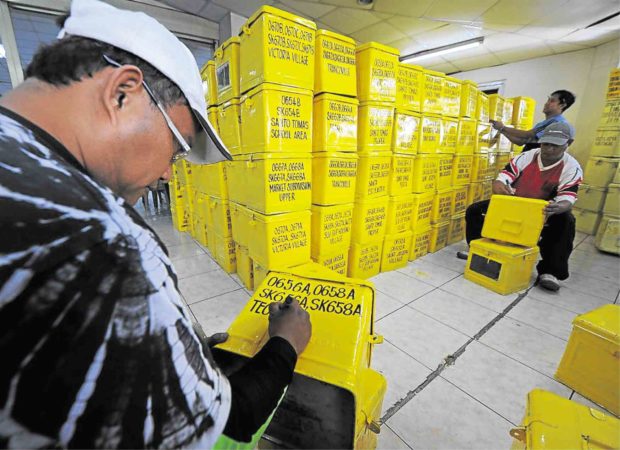
READY FOR POLLS Ballot boxes are readied at the Comelec office in Baguio City for the May 14 barangay and youth polls. Among the issues facing voters in local communities is illegal drugs. —EV ESPIRITU
The Commission on Human Rights (CHR) on Monday aired its concern over the release of a list of the Philippine Drug Enforcement Agency (PDEA) containing names of more than 200 village officials allegedly involved in illegal drugs, saying this violated the local leaders’ basic rights.
“As a law enforcement agency, it is the duty of the PDEA to scrutinize the supposed ‘narcolist,’ gather evidence and file the necessary charges before the courts, rather than make public a list that is devoid of sufficient proof,” the CHR said in a statement written in Filipino.
Publishing the list without due process can destroy the lives of people, especially if they turn out to be innocent, it said.
Aaron Aquino, PDEA director general, on Monday disclosed the names of 90 village chiefs and 117 barangay council members on the government’s drug watch list. He said more names were being validated by different agencies for inclusion on the narcolist. The PDEA alone, he said, has 274 more names on its list.
Aquino said most of these officials were protectors of the drug trade with several of them identified as drug users and pushers.
‘Validated reports’
Aquino said the PDEA would issue another list naming 93 higher-ranking local government officials allegedly involved in illegal drug activities once President Duterte approved its release.
He said this list, drawn from “validated reports,” contains the names of vice mayors, mayors, congressmen, vice governors and governors.
Aquino said “case buildup” was ongoing for the filing of “airtight” cases against the barangay officials on the list.
Malacañang earlier defended the PDEA’s decision to release the list, saying voters were entitled to know who among candidates in the barangay elections had links to the illegal drug trade.
Senators Gregorio Honasan and Panfilo Lacson, who have extensive background in security and law and order, questioned the release of the narcolist before criminal complaints could be brought against the barangay officials.
Honasan, a former soldier, said the premature disclosure of the names would unfairly subject the officials to trial by publicity and violate their rights.
Lacson, a former Philippine National Police chief, said publicizing the intelligence report on officials involved in the drug trade did not make sense.
“First, it could warn the persons concerned, and second, they could be open to harassment or even risk of life which makes such move dumb and equally bad on both counts,” he said in a text message.
Lacson said intelligence reports should be used to assist law enforcers in filing criminal cases and not in a name and shame campaign.
‘Hit list’
Rights group Karapatan called the PDEA narcolist a “hit list.”
“While we deplore the possible involvement of local governments in the proliferation of the illegal drug trade, we consider the … recent narcolist as a hit list,” Karapatan secretary general Cristina Palabay said in a statement.
But Aquino dismissed claims that the PDEA list was a government hit list.
“Let me be clear: there will be no [extrajudicial killings]. This will not serve as a hit list,” Aquino said. “The PNP can make the assurance to the public that these people should also be given protection, that nobody will harm them.”
Come out
“If somebody files [a complaint against us], so be it. I expect that. Our legal team will deal with it,” he said.
In Bicol, Senior Supt. Marlon Tejada, Sorsogon provincial police director, said a separate drug watch list by the police showed that 104 candidates in the barangay elections had drug links.
In Mindanao, most of the village officials whose names appeared in the government’s narcolist denied they were involved in illegal drugs.
Autonomous Region in Muslim Mindanao Gov. Mujiv Hataman urged those on the list to “come out in the open and make themselves available for investigation.” —Reports from Melvin Gascon, Jaymee Gamil, Leila B. Salaverria, Divina Suson, Leah Agonoy, Edwin Fernandez, Julie Alipala, Ma. April Mier, Gabriel Cardinoza and Kimberlie Quitasol